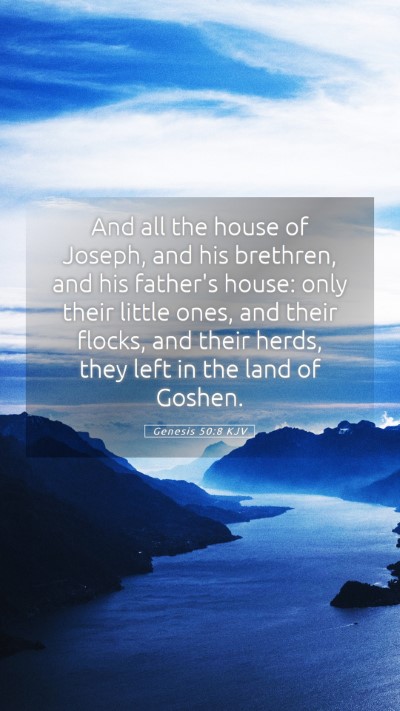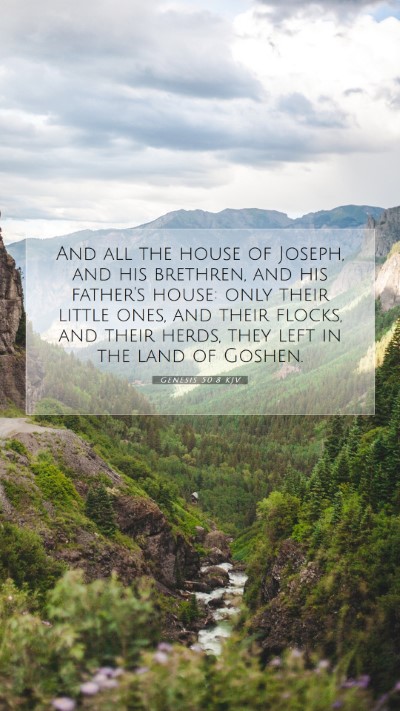Understanding Genesis 50:8
Genesis 50:8 states: “And all the house of Joseph, and his brethren, and the house of his father, only their little ones, and their flocks and their herds, they left in the land of Goshen.” This verse concludes the narrative surrounding the death of Jacob (Israel) and the mourning that ensued, particularly highlighting the family dynamics and their connection to the land of Egypt.
Bible Verse Interpretations
This passage speaks to the importance of familial bonds and the practical logistics of the family of Joseph as they journeyed to bury their father. The following insights from esteemed commentaries provide a deeper understanding of this verse.
Matthew Henry's Commentary
Matthew Henry indicates that this verse illustrates the unity and commitment of Joseph and his brothers during a pivotal moment in their family history. They demonstrated a strong familial bond by leaving only their possessions and the vulnerable members of the family in Goshen while they attended to their father’s burial rites. The choice to take only the necessary persons shows the seriousness of the occasion and their respect for their father.
Albert Barnes' Notes on the Bible
Albert Barnes emphasizes the geographical significance of Goshen, a fertile area in Egypt where Joseph's family had settled. This reflects not just a physical location but a place of safety and sustenance during a time of uncertainty. Barnes highlights how the act of leaving behind their flocks and herds systematizes the family’s priorities – showing care for their livelihood while honoring their father by attending his burial.
Adam Clarke's Commentary
Adam Clarke elaborates on the emotional weight carried in this passage. He relates it to the themes of loss and continuity, where the family must grapple with the death of Jacob while also ensuring that their future and livelihood remain intact. By leaving their small children and animals, they also signify hope for subsequent generations and the intention to maintain their heritage even amidst grief.
Key Themes and Meaning of Genesis 50:8
- Familial Loyalty: The unity between Joseph and his brothers is highlighted as they support each other during a time of mourning.
- The Importance of Heritage: Leaving their possessions in Goshen shows the significance of their roots and future.
- Practicality in Grief: This verse illustrates a balanced approach to grief where they honor their father while still caring for their dependents and livelihoods.
- Symbolism of Goshen: The land symbolizes a safe haven for the family, reinforcing their identity despite the changing circumstances.
Application of Genesis 50:8 in Modern Life
This verse encourages readers to consider the balance between honoring traditions and responsibilities. In our lives, we often face the challenge of attending to family obligations while managing our own lives. This reminder from Scripture urges us to maintain our commitments to family and heritage while being pragmatic in our approach to life's griefs.
Cross References
- Genesis 37:28 – The sale of Joseph by his brothers illustrates their complicated family dynamics.
- Genesis 48:1-4 – Jacob's blessing of Joseph's sons reflects the importance of lineage.
- Genesis 49 – Jacob's final blessings to his sons highlight the continuation of the family legacy.
- Exodus 1:7 – Illustrates the growth of Joseph's family in Egypt after their migration.
Biblical Exegesis and Scripture Analysis
Through the exploration of Genesis 50:8, we gain insights into the themes of loss, family dynamics, and the logistical aspects of caring for those left behind. By studying this passage alongside the commentaries of respected scholars, we can engage in a deeper Bible study that enriches our understanding of Scripture.
Conclusion
This in-depth analysis of Genesis 50:8 reveals the layers of meaning within this seemingly straightforward account. For those participating in bible study groups or seeking bible study guides, this verse serves as a profound example of how family ties endure through times of grief. The insights from public domain commentaries provide valuable perspectives that enhance our understanding of biblical texts and highlight the relevance of these teachings in our lives today.


